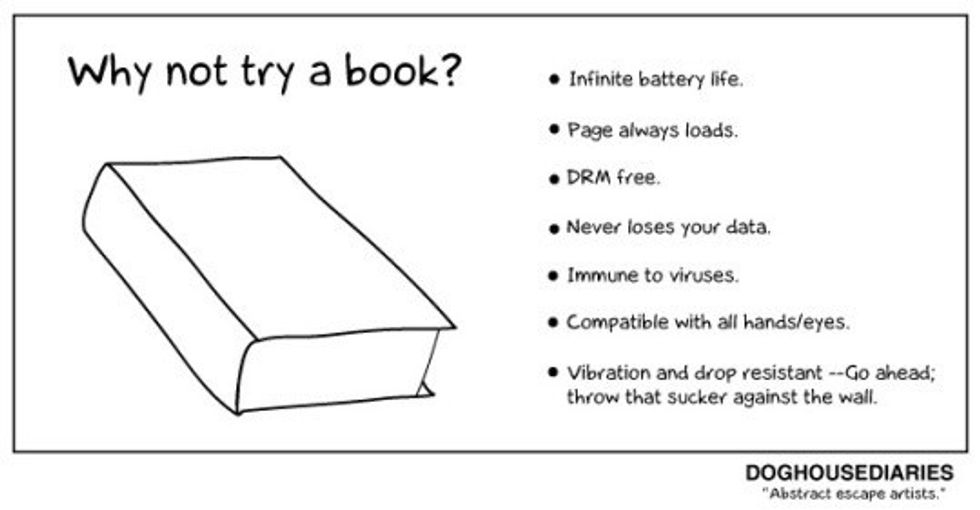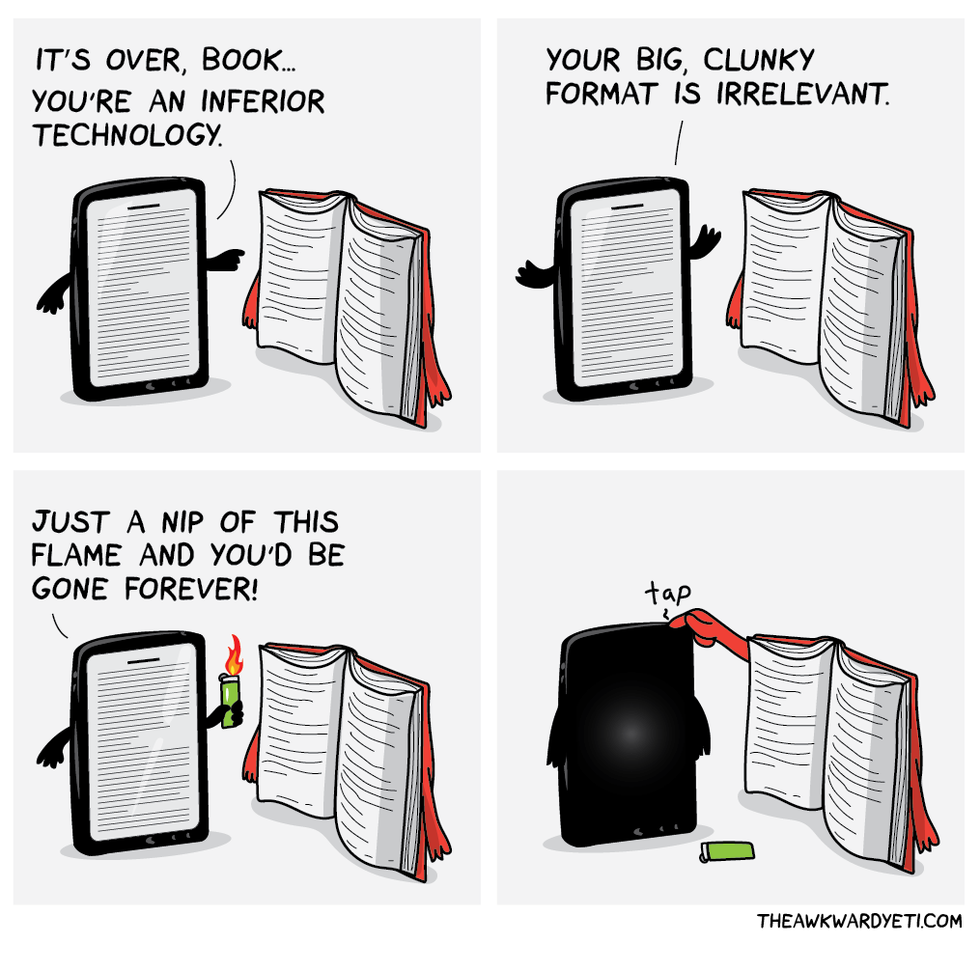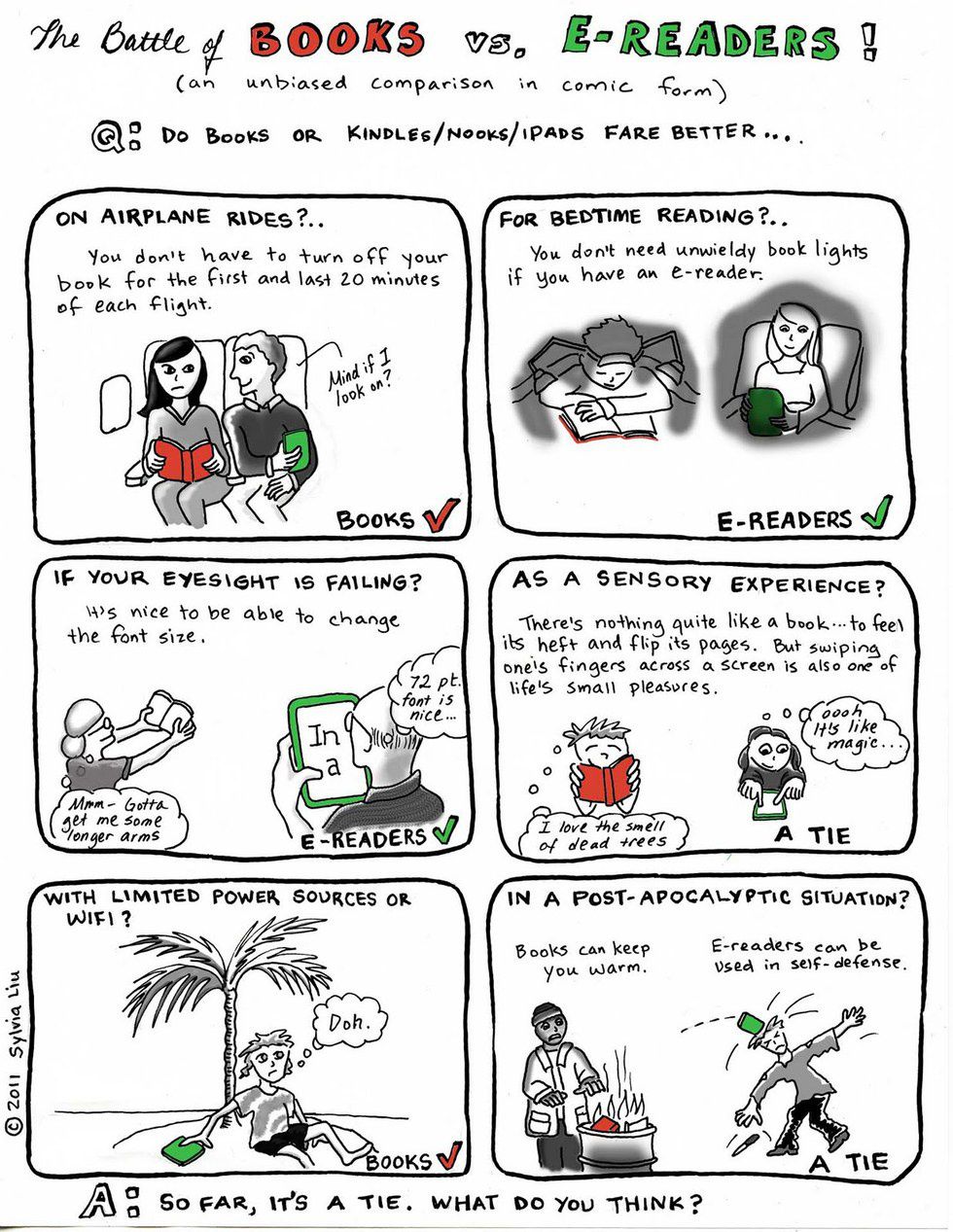A little while back, I did something terrible. I bought an e-book.
Don't judge me. I had my reasons. My next paycheck was still a whole week away and I needed the book for homework due before the estimated arrival date. The e-book version was cheaper and I could have it in an instant. Should be a no-brainer, right? Not really. I'd always fancied myself an advocate of "real books." You know, books printed on paper that you can hold in your hands.
And I had reasons for it, too; I wasn't just freaking out because e-books are some new technology impinging upon the old and sacred mysteries of paper books. It wasn't like that. Even so, I've found there are reasons for loving books in any form.
First, let's not forget paper books are awesome.
1. The tactile factors
I'm not going to get all lovey-dovey about this. Some people reject e-books based on affection for the ink, the smells, the ability to ruffle through pages and the desire to have something to just hold. That's cool. I get it and feel similarly. But I'm more concerned with brains. That is, how do human brains (mine in particular) respond to "real," hold-in-your-hands books? Turns out, paper books have been shown to be better for your concentration, memory, sleep, and emotional responsiveness.
To elaborate: A paper book won't distract you with texts or tweets. It's more personal. Just you and a single book, not a whole library at your indecisive fingertips. If you're studying, there's no reason not to pick the option that will help you remember more. As always, staring at a bright screen (even if it's been dimmed and you have a nighttime red light app) is going to mess with your sleep. The humble paper book will only disrupt your sleep by virtue of the story. And why bother reading if you don't care about your own emotional reaction? Even the most matter-of-fact book should have some resonance.
So if you're sentimental about wanting a book to hold in your hands, there are some real benefits. I don't know if this will hold true for the toddlers I see in grocery stores playing with their parents' phone. A generation exiled from paper might have a different response to a book that's not on a screen. But for now, the evidence seems to be in favor of solid paper books.
2. Benefits of something solid

I can read a paper book in the bathtub, on an airplane, in a power outage... you get the idea. Moreover, you can actually own a paper book. Generally, the cloud is pretty safe. Your book won't get damaged by water. You can't loose it. But you can lend a book as many times as you like. You can write directly in the margins. Highlighting and underlining in any color of the rainbow is your prerogative. That's the kind of thing I want out of a book.
Most e-books give you three colors tops and margin notes aren't an option. You can type a note, sure, but they rarely appear next to the relevant passage. Too much hassle.
3. Telling the textbook industry where to shove it
...up their upturned snobby noses and greedy maws. The textbook industry is always in search of some extra cash. So how about a textbook access code? It'll give you access to subpar learning material with poorly conceived homework and an interface that makes the term "user-friendly" want to go cry alone in a corner. Well, now you can buy a textbook code and an e-book and have the worst the world can offer your education! Is that great?
All joking aside, despite buying a book required for a class in electronic form, I would never have done so if it were a "real" textbook. It was just an ordinary book a person might pick up for pleasure reading that my class is reading for education.
And the larger publication industry has some questions to answer if e-books really hit it off. Buying paper books will support authors more. As both an avid reader and an aspiring writer, that's concerning. If I don't want a book enough to buy it, I'd consider the local library before buying an e-book.
Yet there are still some reasons why e-books aren't a sign of Armageddon.
1. CTRL + F
If you don't know what I'm talking about, I'm not sure how you use a computer. You have my respect for doing thing the hard way. But there's an easier one. Hit CTRL and the letter "F." A little box will appear. Type in a letter, word, or phrase and a temporary highlight will appear on any instances of that word on the webpage you're on. For example, I use it and can see that the word "books" appears 22 times (now 23) in this post.
This is pure magic when you're trying to find a certain passage. Where was that thing I read about dolphins again? Just hit CTRL + F and I can quickly find it. Without the tactile memory of where things are in a book, this is more immediately helpful than flipping through the pages trying to find it. It might be a little less satisfying when you finally find the thing, but it's worth it all the same.
2. Benefits of something intangible
Unlike when I'm lugging 20 pounds of books across campus in my backpack or stuck choosing which hardcovers to pack, I don't need to worry about the weight of an e-book. I don't have an e-reader (nor do I much want one), but both my tablet or my laptop work just fine. If you have a smartphone, your entire library can weigh less.
And speaking of libraries, many libraries have the option to borrow e-books and stream audiobooks. Check out your local library website for details. Or you could be revolutionary and actually ask a librarian in person. With your mouth. Whatever you do, know libraries are still important.
Since the maligned e-book is intangible, just information, you can read it almost anywhere. Unlike a print book, I wouldn't recommend the bathtub. Your phone or e-reader or any such device should be nowhere near a bathroom anyway. (I'm looking at you, toilet-scrollers.) But I can read my books on my tablet without any internet and on any similar piece of technology with internet access.
3. Telling the doom-sayers to give it a rest

Or when illuminated manuscripts lost the great popularity contents because all anyone seemed to be interested in was some upstart's printing press. Granted, those who were panicking were probably more worried about people learning to read the Bible for themselves and actually thinking... the horror.
Regardless, even us avid apologists of paper should learn a lesson. We don't have to worry over or be shocked by books suddenly appearing in new forms as new technology churns out new options for reading. Whatever the form, a book is still a book. And the more people who can read it, the better.







 StableDiffusion
StableDiffusion StableDiffusion
StableDiffusion StableDiffusion
StableDiffusion Photo by
Photo by  Photo by
Photo by  Photo by
Photo by 
 Photo by
Photo by  Photo by
Photo by  Photo by
Photo by  Photo by
Photo by  Photo by
Photo by 











